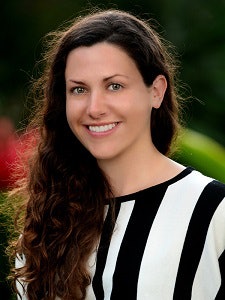Dr. Catherine Pirkle always enjoyed traveling and being in very diverse settings, so she was enthused after learning that she had been selected as a Fulbright Specialist by the J. William Fulbright Council for International Exchange of Scholars in spring 2017.
The Fulbright Specialist Program sends U.S. faculty and professionals to serve as expert consultants on curriculum, faculty development, institutional planning and related subjects at international academic institutions for a length of two to six weeks.
Pirkle, an assistant professor in the Department of Health Policy and Management at the University of Hawai’i at Mānoa (UHM), worked with the College of Health Sciences of Trairí (FACISA) and Rio Grande do Norte Santa Cruz – rural satellite campuses of the Federal University of Rio Grande do Norte in northeast Brazil – to conduct research on adolescent health.

More specifically, Pirkle studies the long-term health consequences of having a child during adolescence.
Many federal universities in northeast Brazil established satellite campuses in rural, more inland communities in order to make higher education more accessible to communities that otherwise would not be able to reach it, Pirkle said.
As a Fulbright Specialist, Pirkle jointly worked at the main campus in Natal, which is a community of about 800,000 people on the coast but also traveled to the inland campus, about two hours away.
“[Working at] both campuses was just a really incredible experience because the main campus is very much what you think of when you think of what higher education is in the United States or in Canada,” Pirkle said. “The buildings look very similar … It looks like a big university campus. Natal is a middle-income country so there’s huge income disparities, but it’s got everything you could want there.”
Pirkle has completed projects in Canada (including Nunavik), Bermuda, Colombia, Brazil and Albania that are largely divided into two themes: promoting the food security of pregnant women and reducing their exposure to environmental contaminants and documenting the health trajectories of women with varying reproductive and obstetrical histories.
The research that Pirkle conducted during her stint in the Fulbright program in Brazil “suggests that early childbirth can have negative consequences with regards to cardiovascular disease,” she said. “So we documented increased risk of cardiovascular disease, increased risk of low physical function, low mobility function, frailty, a number of indicators that suggest that it has long term health consequences.”
Pirkle said research needs to now be directed at why and how those long-term consequences happen to those who give birth during adolescence because “…it’s not clear that it’s necessarily that there’s something physiological about having a child during adolescence, but it’s all the consequences related to having a child during adolescence – low educational attainment, high stress, lower overall incomes, just all of those negative consequences that over time, have long term implications on your health.”
Pirkle didn’t originally begin her undergraduate studies at McGill University pursuing a career in global health, however.
“I was actually doing environmental science with a focus on cellular biology. I just took this course that I thought was really interesting and I was just amazed by everything [the professor] did and I wanted to do something similar,” Pirkle said. “And then I decided to do a master’s at the University of Montreal and searched really, really hard to find people who were doing global health and found some supervisors that were willing to take me on. Once I started doing it, I was hooked.”
At UHM, Pirkle teaches several courses on health policy and aging, including a class titled, Managing global Health Service Delivery.
She is also the current chair of the curriculum committee for her department and is involved in a number of local and national organizations, such as the American College of Obstetricians and Gynecologists.
Pirkle has applied for another Fulbright Specialist assignment and if selected, she hopes to go to the Philippines or somewhere near Oceana.
One the things that Pirkle enjoys most about participating in global health research is that she has the opportunity to combine the “sense of discovery and the sense of awe of learning something new with being oriented with what comes with working in a different place,” she said.
“It’s exciting. You’re always learning, you get to benefit from amazing partnerships in which people approach problems very different from you,” she said.
In regards to her professorship at UHM, Pirkle said one of the most
“rewarding things” about her job is how she has been able to help support the academic goals of students in Brazil in addition to other foreign countries.
“What’s been very exciting are the opportunities for exchange between my students in Hawaii and my students in Brazil,” she said. “You get to bring together people who are in master’s and Ph.D. programs in very different backgrounds and you get to bring them together and there’s mutual learning.”
Pirkle received a bachelor’s degree in environmental science from McGill University, a master’s in community health from the University of Montreal and a Ph.D. in public health with a concentration in epidemiology from the University of Montreal.
Monica Levitan can be reached at [email protected]. You can follow her on Twitter @monlevy_













